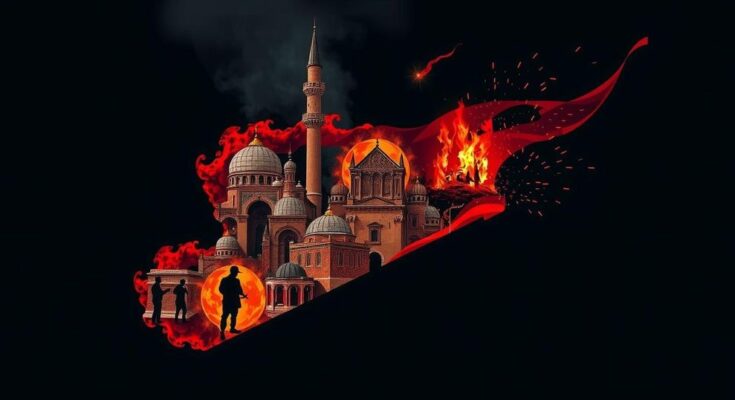The Syrian civil war’s revival prompts Israel to reevaluate its security concerns regarding Iranian and Turkish-backed forces. While it wishes for a weakened Assad regime, total upheaval could lead to chaos, prompting Israel to monitor developments closely. Amid these tensions, Turkey and Iran also seek to exert their influence, with Russia remaining a critical actor in the conflict’s outcome.
The resurgence of the Syrian civil war has led many Israelis to reconsider their position regarding the conflict, as they ponder the implications of either Iranian-backed Shia jihadists or Turkish-backed Sunni jihadists occupying their borders. While Israel seeks to maintain distance from the fighting, it has a vested interest in the outcome, preferring to see a weakened Assad regime without completely toppling it.
Since the civil war reignited on November 27 with an offensive spearheaded by a coalition of Sunni jihadists and Turkish-aligned forces, the geopolitics surrounding Syria has rapidly evolved, particularly influenced by the aftermath of Hamas’s attack on Israel on October 7. That attack catalyzed reactions from Hezbollah and led to Israel’s Operation Northern Arrows, marking a significant shift in the regional dynamics and effectively loosening the grip of key allies supporting Assad.
As Assad’s principal backers—Russia, Iran, and Hezbollah—are currently diverted or diminished, rebels observed an opportunity to retake significant ground, igniting renewed conflict at a critical moment. Though Israel has maintained a hands-off demeanor toward the renewed Syrian conflict, it remains keenly aware of the potential shifts in power dynamics and the need to monitor developments closely.
Israel’s strategic interests lie in preventing Iran from using Syria as a base to bolster Hezbollah. Ideally, a weakened Assad would diminish the Syrian military’s capability to pose a threat while potentially moving away from Iranian influence towards more moderate regional powers. However, a complete downfall of the Syrian regime could lead to chaos, which Israel recognizes could jeopardize its security. Despite the uncertainty in the region, Israel appears poised to continue its policy of careful observation and cautious intervention, should its security be threatened.
Turkey, meanwhile, is leveraging the current conflict to assert control over the refugee situation within its borders and suppress Kurdish movements in Syria. Erdogan’s support for the rebels aligns with his goals of repatriating Syrian refugees and consolidating Turkey’s influence in the region.
Iran’s position is severely challenged as it seeks to maintain its strategic foothold in Syria—a critical corridor for arms to Hezbollah. Following significant Israeli military operations weakening Hezbollah, Iran’s resources are now stretched thin, limiting its ability to support Assad effectively. Additionally, Russia’s interests remain entrenched in the ongoing conflict, with its military support for Assad designed to counterbalance U.S. influence in the region and secure strategic military bases in Syria.
The article discusses the complex and fluid geopolitical landscape in Syria, particularly in light of the recent resurgence of the civil war amid changing alliances and conflicts. It outlines the strategic positions and interests of key players involved—the state of Israel, Turkey, Iran, and Russia—demonstrating how each is affected by the evolving circumstances. The implications of these dynamics extend beyond Syria, reshaping the regional balance of power and presenting challenges and opportunities for those involved.
In summary, the escalating conflict in Syria represents a multifaceted challenge for Israel and its neighbors, with each country navigating competing interests amid shifting allegiances. Israel’s policy of observing the conflict speaks to its strategic aim of maintaining stability while avoiding chaos. As external actors like Turkey, Iran, and Russia maneuver for influence, the potential outcomes will significantly impact regional security and alignments for the foreseeable future.
Original Source: www.jpost.com




